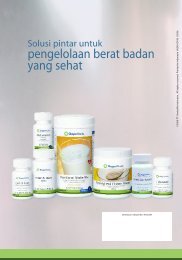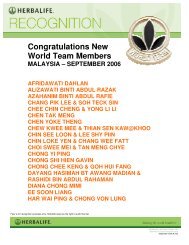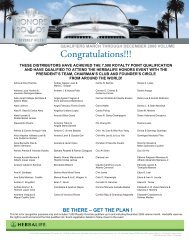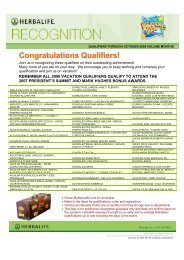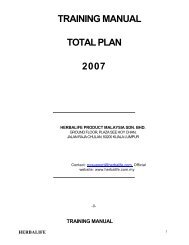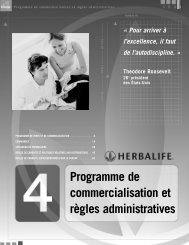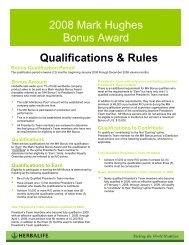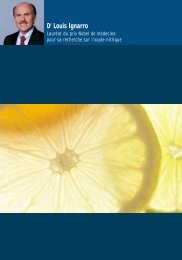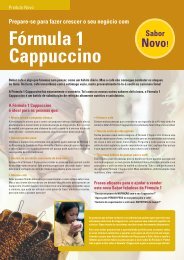Dr. Louis Ignarro - Herbalife
Dr. Louis Ignarro - Herbalife
Dr. Louis Ignarro - Herbalife
Create successful ePaper yourself
Turn your PDF publications into a flip-book with our unique Google optimized e-Paper software.
<strong>Dr</strong>. <strong>Louis</strong> <strong>Ignarro</strong><br />
Nobel Laureate in Medicine<br />
For Nitric-Oxide Research
<strong>Dr</strong>.<strong>Ignarro</strong>’s<br />
Nobel Prize Medal<br />
IN 1998, DR. LOUIS IGNARRO<br />
was named a Nobel † Laureate, joining<br />
an elite group of scientists including<br />
Albert Einstein, Linus Pauling and<br />
Marie Curie, whose discoveries have<br />
had a dramatic impact on humankind.<br />
<strong>Dr</strong>. <strong>Ignarro</strong> received the Nobel † Prize<br />
for his groundbreaking research on<br />
Nitric Oxide. A tireless researcher, he<br />
has continued to push the boundaries<br />
of science even further. The result is<br />
a unique formulation of ingredients<br />
based on Cellular Nutrition ® that<br />
optimizes production of healthenhancing<br />
Nitric Oxide in the body.<br />
Among his many distinctions, <strong>Dr</strong>.<br />
<strong>Ignarro</strong> was inducted into the National<br />
Academy of Sciences and the<br />
American Academy of Arts and<br />
Sciences in 1999. He received the<br />
Basic Research Prize of the American<br />
Heart Association for his outstanding<br />
contributions to the advancement of<br />
cardiovascular science. He is also the<br />
founder and president of the NITRIC<br />
OXIDE Society, as well as founder and<br />
editor-in-chief of the scientific journal<br />
NITRIC OXIDE Biology and Chemistry.<br />
†<br />
The Nobel † Prize is a registered trademark of The Nobel Foundation.<br />
2
Highlights<br />
from <strong>Dr</strong>. <strong>Ignarro</strong>’s soon-to-be-published book<br />
Though you may never have heard of<br />
Nitric Oxide, scientific research from<br />
around the world has demonstrated<br />
that Nitric Oxide is one of the most<br />
significant molecules in the human body<br />
and is crucial to your well-being. The<br />
difference between health and<br />
dysfunction is often the level and<br />
activity of Nitric Oxide in your body.<br />
Nitric Oxide is critical to the promotion<br />
of both your health and longevity.<br />
The immune system uses Nitric Oxide<br />
to combat toxins, providing a strong<br />
internal defense system.<br />
Nitric Oxide is actually a gas that acts<br />
throughout the body as a messenger,<br />
sending and receiving messages that<br />
regulate the activity of cells. Nitric<br />
Oxide instructs the body to perform<br />
The brain relies on Nitric Oxide to<br />
store and retrieve long-term memories<br />
and to transmit information within<br />
the nervous system.<br />
certain key functions. In fact, Nitric<br />
Oxide influences the<br />
Nitric-Oxide deficiency can contribute to<br />
functioning of nearly every major disease of our times.<br />
virtually every organ<br />
in the body, including the lungs, liver,<br />
kidneys, stomach, genitals and, of<br />
course, the heart.<br />
Nitric Oxide enhances blood flow to the<br />
genitals, thus playing an important<br />
role in normal sexual functioning.<br />
Endothelial cell<br />
NO<br />
Muscle cell<br />
The cardiovascular system uses Nitric<br />
Oxide to control blood flow to every part<br />
of the body. Not only can Nitric Oxide<br />
relax and dilate (enlarge) the blood<br />
vessels, thus ensuring that blood can<br />
efficiently nourish the heart and tissues<br />
of the entire body, Nitric Oxide can also<br />
support healthy blood pressure levels.<br />
Nitric Oxide is a powerful antioxidant,<br />
inactivating so-called “oxygen radicals”<br />
(free radicals) in the body that can<br />
contribute to cell damage.<br />
A deficiency in Nitric Oxide can have<br />
a dramatic impact on your health.<br />
Nitric-Oxide deficiency can contribute<br />
to nearly every major disease of our times.<br />
A total lifestyle approach to supporting<br />
Nitric-Oxide levels including a healthy<br />
diet, exercise and nutritional<br />
supplementation, provides a wide range<br />
of benefits throughout the body.<br />
Nitric Oxide influences<br />
the functioning of virtually<br />
every organ in the body.<br />
3
Keeping a Pulse on Your<br />
Cardiovascular Health<br />
The most vital statistics for checking your<br />
heart health are pulse and blood<br />
pressure. Both are taken through the<br />
arteries. But did you know that your<br />
arteries–in fact all your vessels–also<br />
serve another critical function? The<br />
production of Nitric Oxide!<br />
In addition to arteries which carry oxygen-rich blood<br />
away from the heart, your vessels also include veins<br />
which carry blood to the heart and capillaries which<br />
connect the arteries to the veins. Laid out end to<br />
end, an adult’s vessels would be nearly 100,000<br />
miles long! When you think of it that way, it’s easy to<br />
understand how your vascular system could exert an<br />
important regulating influence over cells throughout<br />
your body. Similarly, it also becomes clear how a<br />
compromised vascular system can limit the function<br />
of vital organs, such as your heart and brain.<br />
ATHEROSCLEROSIS<br />
Although people tend to focus on cholesterol levels when<br />
considering their heart health, Nitric Oxide is also an<br />
important part of the story, since it helps preserve the<br />
youthful elasticity of vessels.<br />
Hardening of the arteries, or atherosclerosis, is the process<br />
where cholesterol-based plaques form within the arteries<br />
impairing blood flow, while at the same time, the thickened<br />
walls of the arteries lose their elasticity. Build-up of<br />
plaques effectively narrow the arterial opening through<br />
which the blood flows, putting additional stress on your<br />
heart to work harder. And if a blockage develops, it can<br />
result in a heart attack (blocking flow to your heart) or<br />
stroke (blocking flow to the brain).<br />
Hardening of the arteries typically starts in early adulthood<br />
and progresses as people grow older. Several factors<br />
contribute to the formation of plaque, including high blood<br />
cholesterol, dietary fat and smoking. Atherosclerosis is the<br />
cause of more than half of all mortality in developed<br />
countries and is the leading cause of most heart attacks.<br />
Heart-disease risk factors<br />
you CAN’T change<br />
Increasing age: Four out of five people who die of coronaryheart<br />
disease are 65 or older. After menopause, hormonal<br />
changes put women at a higher risk of developing heart<br />
disease.<br />
Gender: Men have a greater risk of heart attacks than women<br />
and have heart attacks earlier in life. Still, heart disease is the<br />
leading cause of death for U.S. women.<br />
Heredity: Heredity is also a factor. If your parents had heart<br />
disease, you’re more at risk.<br />
Heart-disease risk factors<br />
you CAN change<br />
Smoking: If you smoke, your risk of heart attack is more than<br />
twice that of nonsmokers.<br />
Obesity or overweight: People who carry extra weight–especially<br />
in the waistline–have a greater likelihood of stroke and heart<br />
disease.<br />
High levels of LDL or “bad” cholesterol: Although age, gender<br />
and heredity factor into your cholesterol level, you can also<br />
control it through diet.<br />
Low levels of HDL or “good” cholesterol: While low levels are a<br />
warning sign, high levels are considered heart protective.<br />
High blood pressure: High blood pressure contributes to a<br />
majority of all heart attacks and strokes.<br />
Diabetes: People who have diabetes often end up with some<br />
form of cardiovascular disease.<br />
Physical inactivity: Those who do not exercise regularly greatly<br />
increase their risk of heart disease.<br />
Elevated triglyceride levels: This often goes along with<br />
elevated LDL cholesterol as a risk factor.<br />
Elevated homocysteine levels: High levels of homocysteine has<br />
been linked with arterial damage and increased risk of heart<br />
disease.<br />
Stress: Some evidence suggests that high stress can make<br />
cardiovascular disease more likely.<br />
4
Benefiting from<br />
Cutting-Edge Science<br />
MORE THAN ANY OTHER SINGLE<br />
FACTOR, NITRIC OXIDE MAY BE THE KEY<br />
TO LIVING A LONGER, HEALTHIER LIFE.<br />
<strong>Dr</strong>. <strong>Ignarro</strong> has never been one to rest<br />
on his laurels. That’s why a new<br />
supplement goes even beyond<br />
<strong>Dr</strong>. <strong>Ignarro</strong>’s Nobel † -prizewinning<br />
research. It’s a refinement that’s all<br />
about a synergistic blend of ingredients<br />
with complementary action to produce<br />
more Nitric Oxide and maintain higher<br />
Nitric-Oxide levels in the body.<br />
This may be the first time you’ve heard<br />
of Nitric Oxide, but guaranteed, it<br />
won’t be the last. As the key to good<br />
health, it’s the missing link that may<br />
make the difference in understanding<br />
all kinds of age-related illnesses and<br />
circulatory disorders. The cascade of<br />
benefits from increased Nitric Oxide<br />
are suggested by the growing body of<br />
research indicating the role of healthy<br />
vessels in preventing cardiovascular<br />
disease and age-related disorders.<br />
Make Supplementation a Priority<br />
NUTRITION THAT COUNTS<br />
Exercise and certain foods promote<br />
Nitric-Oxide production in your body. A<br />
new supplement is designed for<br />
nighttime consumption when your body<br />
is producing the least amount of Nitric<br />
Oxide from food and exercise. However,<br />
this formula can also be used during the<br />
day. Nighttime or daytime, it would be<br />
difficult to ingest the same amount of<br />
L-Arginine from foods as what your body<br />
gets from supplementation.<br />
†<br />
The Nobel † Prize is a registered<br />
trademark of The Nobel Foundation.<br />
5
Vascular Nutrition and Your Health<br />
Why is vascular nutrition so important? Your vascular system delivers oxygen-rich blood<br />
to cells throughout your body. Youthful, properly nourished vessels are flexible. This<br />
elasticity allows them to deliver a healthy flow of blood throughout the body, providing<br />
nutrition to your cells.<br />
Plaque build-up<br />
in artery impedes<br />
blood flow.<br />
HARDENING OF THE ARTERIES<br />
As we age, the walls of our arteries may<br />
thicken and become rigid, while at the<br />
same time, deposits or cholesterol-laden<br />
plaques can build up along the lining of<br />
the vessels. This process is called<br />
atherosclerosis, commonly known as<br />
“hardening of the arteries.” As the heart<br />
pumps blood through a now-smaller<br />
opening in the vessel, blood pressure rises<br />
and puts stress on the heart and other parts<br />
of the body.<br />
NOBEL † PRIZE-<br />
WINNING RESEARCH<br />
So how can you preserve the health of<br />
your vessels? <strong>Dr</strong>. <strong>Ignarro</strong>’s breakthrough<br />
research tells us that Nitric Oxide, a<br />
naturally occurring compound in your<br />
body, is the key to healthy vessels. And<br />
conversely, Nitric Oxide deficiency can<br />
contribute to serious ailments that<br />
typically occur with aging.<br />
Through vascular nutrition, you can<br />
increase the production of Nitric Oxide,<br />
which “exercises” or expands your<br />
vessels, increasing their youthful elasticity.<br />
In addition, Nitric Oxide is an important<br />
biological messenger that causes a<br />
cascade of benefits at the cellular level<br />
which can improve circulatory, immuneand<br />
nervous-system function.<br />
NITRIC OXIDE DEFICIENCY AND<br />
ENDOTHELIAL DYSFUNCTION<br />
Cardiovascular disease is the leading<br />
cause of morbidity and untimely death in<br />
North America and is sometimes<br />
associated with Nitric Oxide deficiency.<br />
The diseases resulting from Nitric Oxide<br />
(NO) deficiency include hypertension,<br />
stroke, atherosclerosis, heart attacks,<br />
diabetes, Alzheimer’s disease,<br />
gastrointestinal ulcers and erectile<br />
dysfunction. A healthy vascular<br />
endothelium is essential to a healthy<br />
cardiovascular system because it is<br />
required for normal NO production and<br />
action. Vascular-endothelial dysfunction<br />
leads to decreased NO production and<br />
increased oxidative stress, creating a<br />
vicious cycle that promotes further<br />
endothelial dysfunction.<br />
PROMOTING A HEALTHY<br />
ENDOTHELIUM<br />
The most important mechanism by which<br />
the body stimulates endothelial NO<br />
production is exercise. Physical activity<br />
promotes blood flow through the millions<br />
of arteries in the body and the friction of<br />
the blood flowing against the endothelial<br />
cells lining the arteries stimulates the<br />
production of NO. This is how exercise<br />
promotes not only a healthy heart and<br />
healthy cardiovascular system, but also a<br />
healthy body, and it’s all due to the work<br />
of NO to promote Cellular Nutrition ® .<br />
SUPPLEMENTS INCREASE NO<br />
PRODUCTION<br />
In addition to exercise, taking certain<br />
nutritional supplements can increase the<br />
production and action of endotheliumderived<br />
NO. These natural substances<br />
include L-arginine and L-citrulline, which<br />
serve as the body’s fuel to make NO, and<br />
L-taurine, vitamin C, vitamin E and<br />
alpha-lipoic acid, which work to protect<br />
NO against oxidative destruction by free<br />
radicals.<br />
When taken together at the same<br />
time, these natural ingredients may<br />
enable endothelial cells to produce more<br />
NO for a healthy endothelium, lower<br />
blood pressure and protect against<br />
cardiovascular disease.<br />
DIET IMPROVES HEART HEALTH<br />
Another way to keep your endothelium<br />
healthy is through diet. A sensible diet<br />
that is low in fats and carbohydrates, but<br />
rich in proteins, will go a long way in<br />
promoting cardiovascular health.<br />
Decreased fat intake greatly reduces the<br />
body’s production of destructive free<br />
radicals and decreased dietary<br />
carbohydrates limit the intake of calories.<br />
Eating a high-protein diet maintains<br />
muscle mass and energy levels. The<br />
combination of high protein plus low<br />
carbohydrates and fats can result in<br />
substantial weight loss, which further<br />
promotes a healthy cardiovascular<br />
system.<br />
A WINNING COMBINATION<br />
The three lifestyle changes outlined–mild<br />
to moderate exercise, a high-protein diet<br />
and supplementation–have something<br />
in common: they all play a role in<br />
enhancing the production and action<br />
of endothelium-derived Nitric Oxide.<br />
For this reason, exercise, diet and<br />
supplementation are a winning<br />
combination for<br />
maintaining and<br />
improving your<br />
endothelial health–and<br />
a healthy endothelium<br />
means a healthy heart.<br />
When you combine their<br />
results, you can easily see how<br />
your overall health and general wellbeing<br />
can improve.<br />
6 †<br />
The Nobel † Prize is a registered trademark of The Nobel Foundation.<br />
6
Here is an overview of key<br />
ingredients to enhance<br />
Nitric Oxide.<br />
L-ARGININE<br />
A naturally occurring amino acid found in food,<br />
L-Arginine is a protein that the body uses to make Nitric<br />
Oxide. It’s difficult to consume enough L-Arginine<br />
through food to get the same Nitric Oxide boost available<br />
in a supplement.<br />
L-CITRULLINE<br />
An amino acid that may be found in melons,<br />
L-Citrulline supports the production of additional<br />
L-Arginine, which in turn produces more Nitric Oxide.<br />
D-ALPHA TOCOPHEROL (Vitamin E)<br />
This preeminent fat-soluble antioxidant can penetrate the<br />
cell membrane to neutralize free radicals and promote<br />
cell health. Vitamin E supports the activity of Nitric Oxide<br />
and improves endothelium (vessel lining) health.<br />
L-TAURINE<br />
An amino acid abundant in humans. L-taurine is an<br />
antioxidant. It also increases nitric oxide and helps<br />
improve performance in exercise.<br />
ASCORBIC ACID<br />
Vitamin C is a water-soluble<br />
antioxidant. Studies show that the<br />
combination of vitamin C, vitamin E<br />
and L-Arginine work synergistically to<br />
enhance Nitric Oxide production.<br />
ALPHA LIPOIC ACID<br />
A co-factor in vital energy-producing reactions in<br />
the body. Assists in dilation or expansion of vessels. Also<br />
has strong antioxidant activity, while helping recycle<br />
vitamins C and E.<br />
FOLIC ACID<br />
Promotes healthy levels of homocysteine, which, in excess,<br />
can damage the lining of the arteries.<br />
CALCIUM FOLINATE<br />
A source of folinic acid. This compound is bioavailable<br />
and helps promote healthy homocysteine levels, which<br />
at high levels can injure the arterial lining.<br />
LEMON BALM<br />
Perennial herb in the mint family with a history dating<br />
back 2,000 years. Acts as a calming agent.<br />
Your vessels deliver oxygen-rich<br />
blood throughout your body.<br />
7
BRINGING IT ALL TOGETHER<br />
During the day, you try to eat right and exercise regularly, both of which can<br />
stimulate Nitric Oxide production. But during the night, when Nitric Oxide<br />
production is naturally at its lowest, what can you do to improve your health?<br />
With beneficial supplementation before going to sleep, you’re priming the<br />
body for Nitric Oxide production. Your sleep will be restful and you can wake<br />
up feeling rejuvenated from your glass of nighttime nutrition.*<br />
MAKE NUTRITIONAL SUPPLEMENTS<br />
WORK IN TANDEM<br />
Protein Shakes: L-Arginine is found in<br />
soy, which is the source of protein in<br />
some products. Protein shakes<br />
provide the foundation for daytime<br />
nutrition.<br />
OUTER NUTRITION<br />
Through increased production of<br />
Nitric Oxide, it promotes circulation.<br />
That means you can have improved<br />
blood flow, and consequently more<br />
oxygen, to all the organs of your body,<br />
including your skin. The additional<br />
oxygen can help with detoxification,<br />
so your skin may stay clearer.<br />
EXERCISE<br />
For total wellness, fitness is an<br />
important component of your life plan.<br />
The body responds to exercise by<br />
producing Nitric Oxide. Here’s how it<br />
works: the increased blood flow<br />
produced by exercise stimulates the<br />
cells in the lining of your vessels to<br />
produce Nitric Oxide. It’s one of the<br />
reasons that exercise is so good for<br />
you and “keeps you young.”<br />
©2004



